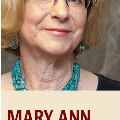BY MARY ANN STEINER

Maybe I'm listening and pondering things more, or maybe the readings of the season just past raised glad tidings in different ways for me this year. Because the stories that struck me were the ones about the old people who appear in the stories that precede and follow the miracle birth, the characters whom only the evangelist Luke describes.
First there was Elizabeth, Mary's much older cousin, living with the shame of her age and barrenness. And there was Zechariah, her even older husband, made mute from the moment he doubted the prophecy of Elizabeth's pregnancy until he affirmed the baby's name as John, all at the sport of family and neighbors who wondered if he'd slipped into senility.
Then there were ancient Simeon and the prophetess Anna. Simeon had been promised by God that he wouldn't die until he beheld the Messiah, so when his parents placed Jesus in Simeon's arms, the old man recognized the baby as the one he'd been waiting for. Anna, an aged widow who took up residence in the Temple to await the Messiah, saw him and prophesied the greatness he would bring to God's people. The respect Jerusalem's Jews had for Simeon and Anna's announcement that the Savior had arrived was a way for Luke to acknowledge the truth of the promise being fulfilled.
The humiliation of Zechariah and Elizabeth compared to the regard for Simeon and Anna is not so different from how older people in the United States are perceived and cared for today. The divide is wide between those who are held up as wisdom characters and beloved mentors and others who are alone, living in situations of compromise and confinement, who never thought the hard work and planning of their middle years would yield the end stage they find themselves in.
There is a crisis in the care of elderly people in the way they are insured (or not), in the limited options for housing, in transitions of support and care, and especially in the financial arrangements that force many older people to fall into poverty and limited options in their old age. Like other disparities in our society, the pandemic has shone a harsh light on the inequities of aging in America.
Medicare, the federal program for senior health care, and Medicaid, the federal program of health care for low-income citizens, were signed into law in 1965. That year the average life expectancy was 70 years, generally just a few years after expected retirement age. With the life expectancy in the U.S. approaching 80 years and expected to go up, the safety nets created to support seniors and people with certain illnesses or disabilities are being stretched to accommodate health care costs for many more years per person than originally expected.
Health care for the elderly has become what is known as a "wicked problem." Wicked problems don't exist in math, logic or the hard sciences, only in the social sciences, policy and planning. The solutions to wicked problems are never simply true or false, just good or bad, better or worse.
What has Catholic health care to do with all of this? Very much. The Catholic health ministry begins with the dignity of every person, and especially vulnerable persons who may be ill, troubled, aged or poor. Older people are often all of those things, which means they need a special kind of care and protection that our ministries have been rendering since the founding of the first Catholic homes for the elderly in the U.S. in the 1840s.
Now many of the Catholic nursing homes and long-term care facilities are closing, being sold, or being reconfigured for a payer mix that will keep them viable. How those developments can be kept true to our ministry, how to explore the opportunities for aging well, how to finance the facilities our elders need, how to pursue policy changes that improve care and what role Catholic health care may need to relinquish or remake are topics you can explore in this Winter 2021 magazine.
Before you delve into the articles though, turn to page 11 and consider Pope Francis' exhortation to the young and hearty about the honor and love they should give to parents and grandparents. Then go and do likewise.
— Mary Ann Steiner